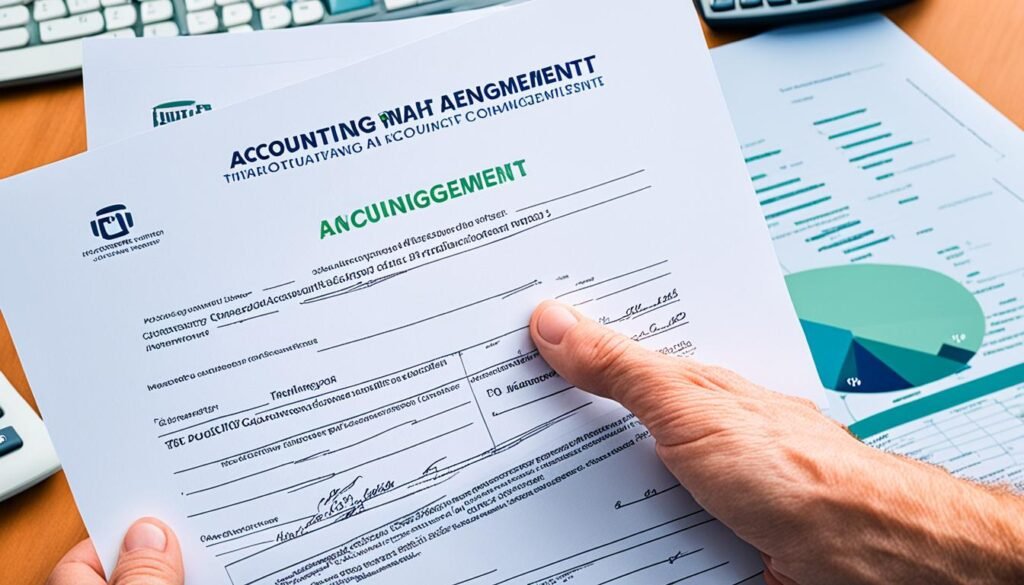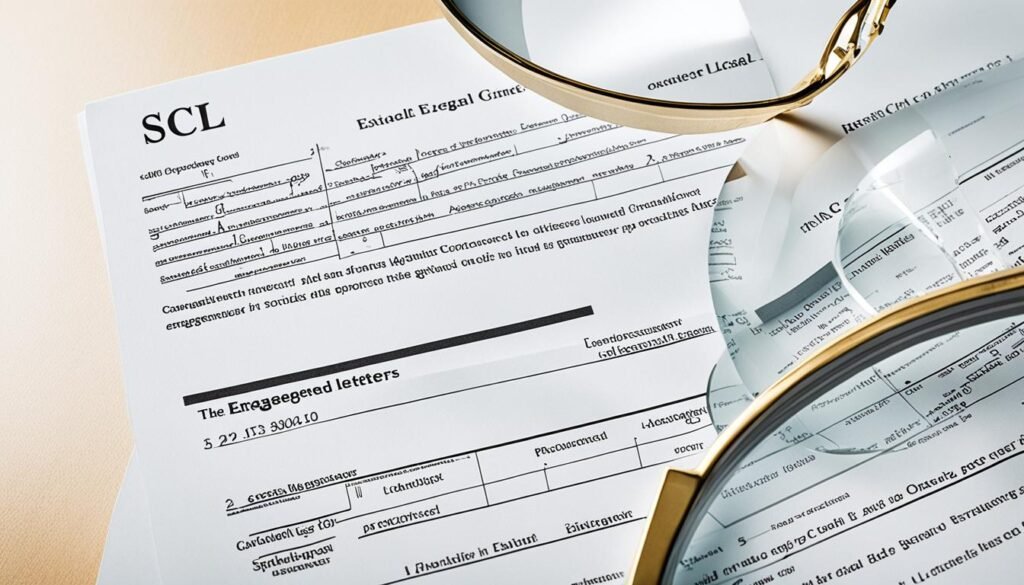“The value of an idea lies in the use of it.” – Thomas Edison
An accounting engagement letter is key to a good client-accountant relationship. It’s not just a formality. It’s a tool that outlines services, sets expectations, and protects everyone. We’ll look at the main parts of accounting engagement letter templates. We’ll share tips for making these agreements and help you make onboarding clients easier.
A strong accounting engagement letter is necessary if you’re a CPA, tax expert, or bookkeeper. It helps manage client relationships and makes the work smooth. This letter outlines services, fees, and who does what. It’s like a guide for a good partnership. Let’s learn how to make accounting engagement letter templates that work well.
An accounting engagement letter is a formal agreement. It outlines the services an accountant or firm will provide to a client. This document is a contract. It clearly states the services, responsibilities, and fees.
The definition of an accounting engagement letter is a written agreement. It sets the terms and conditions of the services. The purpose of an engagement letter for accountants is to ensure everyone knows what to expect from the start.
It helps protect both sides by setting clear expectations. This prevents misunderstandings and outlines the services to be done. The engagement letter is key for a smooth working relationship during the accounting work.
“An accounting engagement letter is a critical document that sets the stage for a successful, mutually beneficial relationship between an accountant and their client.”
Writing a detailed accounting engagement letter is key to making things clear between the accounting firm and the client. This letter lists the main parts that need to be included for a good agreement. These parts help both sides work well together during the project.
A good accounting engagement letter has these main parts:
By covering these Key Components of Accounting Engagement Letter and Required Elements of Engagement Letter for Accountants, accounting firms can make a clear, agreed-upon contract. This contract helps start a strong relationship with the client.
“A well-crafted accounting engagement letter serves as a roadmap for a successful client-accountant partnership, outlining the responsibilities, expectations, and safeguards for both parties.”
When writing accounting engagement letters, it’s key to use simple language. This makes the letter easy for clients to understand. Avoid using hard words or confusing terms. Ensure the letter clearly lists all important details like services, fees, and what everyone needs to do.
To write a great best practices engagement letter, consider each client’s needs. This will ensure everyone knows what they’re agreeing to. Getting the client to sign the letter is also very important before you start working.
Following these best practices for accounting engagement letters helps clients understand their roles. It also helps avoid any confusion. This makes working together smoother and more successful.
“Drafting an effective accounting engagement letter is crucial for establishing a clear understanding of the services, responsibilities, and expectations between the accounting firm and the client.”
Having a good accounting engagement letter is key to a strong client-accountant bond. Luckily, there are many templates and sample letters out there. They help professionals make agreements that fit their needs.
These templates have important parts, such as who the client and accountant are, what services are offered, how much it costs, and what the client must do. They also cover keeping secrets, ending the agreement, and solving disagreements. By starting with these templates, firms can customize the letter to fit each client’s needs.
Using Accounting Engagement Letter Templates has many perks for accountants and firms:
With a professional engagement letter, accountants can start off right with their clients, setting the stage for a successful partnership.

“A well-crafted accounting engagement letter is the foundation for a productive and transparent client-accountant partnership.”
Accounting engagement letters cover many services. They help with tax, planning, audits, and more. Each client gets a special letter that lists all the services and details.
Some common Accounting Services Covered by Engagement Letters are:
The type of engagement affects the services, fees, and other details in the letter. Firms use different templates for each service, meeting the unique needs of each client, whether it’s tax, audit, or advice.
“Accounting engagement letters are the foundation of a successful client-accountant relationship, outlining the scope, responsibilities, and expectations for both parties.”
Creating special engagement letters for Different Types of Accounting Engagements helps firms offer great service and builds strong, lasting partnerships with clients.
Writing an accounting engagement letter is key to a good client-accountant relationship. It sets the rules for what services will be provided, helps manage clients’ expectations, and keeps everyone safe.
The Importance of Accounting Engagement Letters is huge. They prevent services from getting out of hand, protect the accountant, and make sure everyone knows what the agreement says.
These letters make it easy to change the agreement as clients need things to change. This keeps the accountant ready to help clients in new ways, allowing accountants to provide the best services they can.
The Benefits of Using Engagement Letters for Accountants go beyond one job. They make everyone know what to expect and what the limits are. This builds trust and can make clients stay with you long.
In short, a good accounting engagement letter is key for a strong client-accountant bond. It sets clear rules, keeps expectations in check, and protects everyone. This is very important in accounting.

“An accounting engagement letter is more than just a formality – it’s the foundation for a successful client-accountant relationship.”
Not all accounting engagement letters are the same. Making them fit your firm’s unique services and style is important. By making them fit your firm, you can make a letter that speaks to your clients well.
Start by adding your firm’s logo and contact information. This will show your brand and expertise. Also, use language and tone that fit your professional image and how you talk to clients.
Review and update your engagement letters often. This ensures they show what your firm can do and how you work with clients, keeping your partnership strong with them.
“Customizing your accounting engagement letter is a key way to differentiate your firm and build trust with clients.”
By making your engagement letters fit your firm, you make a document that stands out. This is important in the competitive world of accounting.
Telling clients about the accounting engagement letter is key. Firms must explain it clearly, either in person or online, and they should be ready to answer any questions the client has.
Keeping things clear and talking openly is important. Firms should explain the engagement letter to the client. They should clear up any confusion or questions.
Getting the client to sign the letter makes the agreement official. It ensures everyone knows and agrees to the terms. This step helps start a good working relationship based on trust and clear communication.
“Effective client communication and obtaining their agreement for the engagement letter is crucial for a smooth accounting relationship.” – Jane Doe, CPA
Working together, firms show they are professional. They make sure the client really gets the accounting engagement letter. This builds a strong base for the project. It also makes for a good, open partnership.

Accounting firms need to keep their engagement letters up to date. These letters need to change when services, fees, or other details change. This keeps everything clear and in line with what the firm does now.
Systematic Review and Renewal Process:
Adapting to Changing Circumstances:
“Regularly reviewing and updating engagement letters is essential for maintaining clear, mutually agreed-upon terms with our clients. It’s a proactive step that demonstrates our commitment to transparency and adapting to their evolving needs.”
Accounting firms can build stronger client relationships by updating and renewing engagement letters. They can make sure services run smoothly and follow industry rules.
When dealing with accounting engagement letters, thinking about the legal side is key. Accounting firms must ensure their letters follow the law and professional standards. This keeps both the accountant and the client safe during the work.
The Legal Aspects of Accounting Engagement Letters cover things like limits on liability, how to solve disputes, and keeping client info private. Firms need to follow rules from groups like the American Institute of CPAs (AICPA) or state CPA groups. This keeps them up to Professional Standards for Engagement Letters.
“Following the law and professional standards protects both the accountant and the client.”
By thinking about the legal side and sticking to the right standards, accounting firms can make engagement letters that are clear. They can also reduce risks and build strong relationships with their clients.

In today’s world, accounting firms can use software and tech to make creating, managing, and storing engagement letters easier. These tools are better than old ways, making things faster, less error-prone, and better for clients.
Software like Ignition and PandaDoc are top choices for accountants. They let firms make custom engagement letters, get client signatures online, and keep all documents safe in the cloud. Using this Accounting Engagement Letter Software, accountants save time, cut down on work, and give better service to clients.
Here are the main perks of using this software:
Accounting firms want to work better and make clients happy. Using the right Accounting Engagement Letter Software and Technology Tools for Engagement Letters changes the game. These tools help accountants improve their letter process and give a more efficient, client-focused service.
The world is getting more connected. Accounting firms must understand International Accounting Engagement Letters well. These letters have similar parts everywhere, but each area has big differences. Firms need to know these differences when working with clients from different places.
Accounting letters have rules in places like Canada, Australia, the UK, and the US. They must match local laws and standards. Things like what to say, who is responsible, and how to solve problems can change a lot.
Firms with clients from other countries or planning to work abroad must be aware of these regional variations in engagement letters. It’s key to ensure that they follow the rules and give good service everywhere.
“Tailoring engagement letters to meet the diverse needs of global clients is a critical aspect of running a successful international accounting practice.”
By keeping up with new trends and the best ways to write International Accounting Engagement Letters, firms can handle the global market well and give top-notch service to clients anywhere.
Understanding accounting engagement letters needs knowing special words. This glossary explains important terms. It helps clients and professionals talk better.
Knowing these Key Terms in Accounting Engagement Letters helps clients. They can talk better with their accounting pros.
“Clear communication and understanding of key terms is essential for a successful accounting engagement.”
Accountants and firms can use sample templates to help with creating engagement letters. These Sample Accounting Engagement Letter Templates have all the key parts. They include information about the client and accountant, what services are offered, how much it costs, what the client must do, keeping things secret, ending the agreement, and solving disagreements.
These Free Downloadable Engagement Letter Templates are great for firms to start with. Firms can change the content to fit their needs and what their clients want. Using these tools saves time and ensures the letters follow best practices.
These samples are very useful for new or small accounting firms. They help make writing engagement letters easier, allowing firms to focus on providing great service to their clients.
“Having access to well-structured engagement letter templates has been a game-changer for our firm. It allows us to create professional and compliant documents quickly, while still maintaining the flexibility to customize them to our unique client needs.”
– John Smith, Managing Partner, ABC Accounting Firm
Whether you’re a big or small accounting firm, checking out Sample Accounting Engagement Letter Templates and Free Downloadable Engagement Letter Templates is smart. It helps make sure your engagement letters are full, professional, and meet industry standards.
Accounting engagement letters are key to a strong, lasting relationship between clients and accountants. They ensure everyone knows what services are offered, how much they cost, and what both sides need to do. This helps avoid confusion, keeps risks low, and makes things clear.
Accounting firms should focus on making and handling engagement letters well. They can use the best methods, templates, and tech to make it easier. Keeping engagement letters current and well-made is vital for a successful accounting business.
The need for clear, detailed engagement letters will continue to grow as accounting changes. By prioritizing this important document, firms can be ready for success. They can meet client needs and stay safe from legal and financial risks.